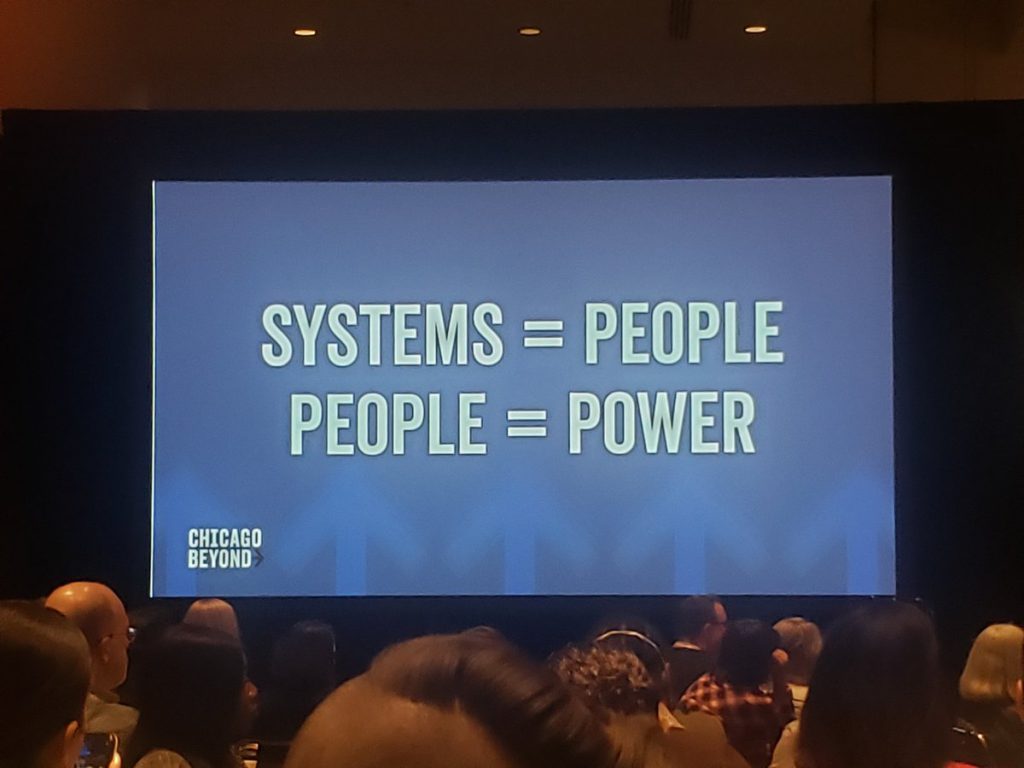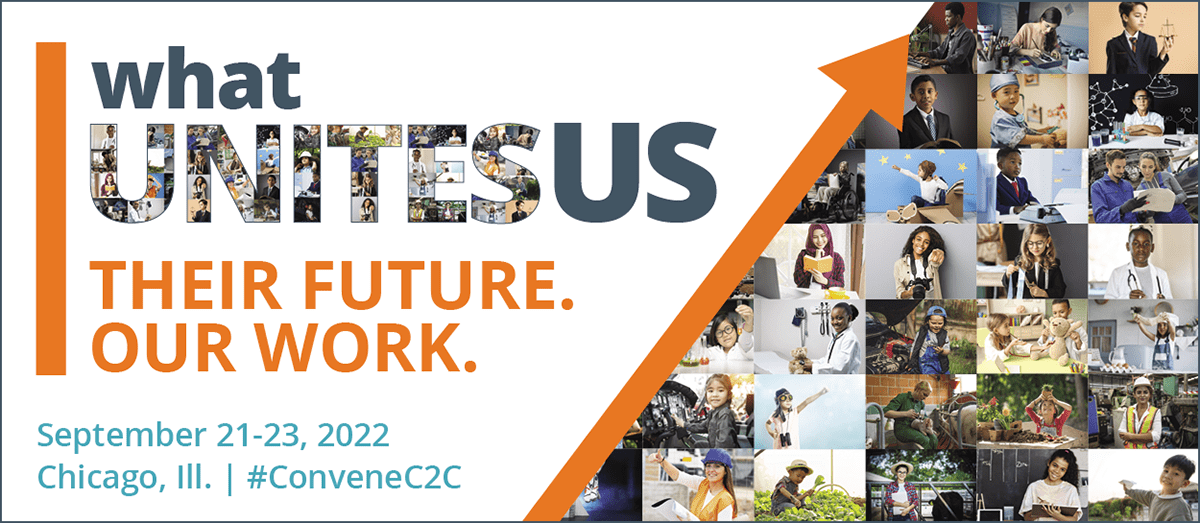Last month, members of the Generation Next team and the Generation Next coalition attended the StriveTogether Cradle to Career Network Convening, under the banner “What Unites Us: Their Future, Our Work.” Other members of the Generation Next team and 19 coalition partners viewed the plenary sessions virtually.
Over the course of the week of September 21-23, 2022, over 500 attendees representing communities across the country attended the Convening in Chicago, with many others tuned in to the convening livestream. StriveTogether CEO Jennifer Blatz opened the convening by sharing her vision of StriveTogether and the future of the network. Kelly Anchrum, vice president of marketing & communication at StriveTogether, summed up the themes of Blatz’s remarks (available in the blog post linked below), including the urgent need for systems change:
“The Cradle to Career Network already reaches one in seven young people ages 0-24. Its work to change lives by changing systems is gaining momentum and becoming a catalytic force in an emergent field ecosystem. The early days of the movement made it clear that systems – those complex interconnections of people, resources, practices and structures – needed re-engineering to deliver better results for kids.”
To read more about Jennifer Blatz’s opening remarks as she shared her bold vision for StriveTogether, click HERE for the full blog post by Kelly Anchrum.

The opening plenary session took place on Wednesday, September 21, and featured Liz Dozier, Founder & CEO of Chicago Beyond, talking about the “Radical Power of One.” Dozier recounted her time as a principal at Fenger High School–when she started her job as principal, Fenger was considered one of the most underperforming and violent schools in Chicago. During her first year, Dozier was facing a drop out rate of 20%, 300 arrests of students, and a 40% graduation rate.
After six years in the role of principal, Dozier had seen the 300 annual arrests drop to less than 10; the drop out rate fell to 2%; and the graduation rate doubled to 80%. Dozier shared her insights with convening attendees on how she was able to turn the school into a “bright spot.”
A quote from Liz Dozier resonated with Generation Next Managing Director Joe Munnich:
“We were operating under the assumption that our high school students need to be controlled. The reality is that we as adults were the barriers to their freedom…we had to take a more holistic approach.”
When reflecting on the session, Joe said that when Liz Dozier explained: “As people within systems, we have the power to change those systems,” it made him reflect on his own role within systems and that this framing stuck with him throughout the rest of the convening.
Isabella Xiong, Project Manager at Generation Next, also shared what she enjoyed about Liz Dozier’s plenary session:
“I appreciated that Liz shared how she continues to do her work; she shared that it’s really about self care and being able to have and experience a true rest of our minds, body and spirit.”
To read the full summary of the opening plenary and Liz Dozier’s speech, click HERE to read the blog post by Elizabeth Male of StriveTogether.
Wednesday, September 21’s Afternoon Plenary Session was focused on the theme of “Building Process Through Civil Discourse,” and featured a discussion between Dr. Robert P. George, professor at Princeton University, and Dr. Cornel West, Professor Emeritus at Harvard University, which was facilitated by StriveTogether’s Josh Davis.
Dr. George and Dr. West are close friends who have opposing views on topics like politics and philosophy, but are a “public example of close friendship across partisan divides.” Josh Davis said about the conversation: “Our work often means having tough conversations about systemic inequities and disparate outcomes with people who may see things differently.”
Dr. West and Dr. George shared their main virtues that help them to “be the glue that holds our fragile democracy together” in the discussion, which were:
- Hold a spirit of intellectual humility
- Be more than an ally
- Connect around values
- Be courageous
To read more about Dr. George & Dr. West’s plenary session, click HERE for the full blog post by Elizabeth Male.
Thursday, September 22nd’s Morning Plenary Session was titled “Understanding our Shared History and Telling our Story” by Clint Smith, an author who previously wrote for The Atlantic and is the author of the book How the Word is Passed: A Reckoning with the History of Slavery Across America. Smith showcased how storytelling can build support for change among community members, partners, and funders.
Smith was joined in the conversation by Jamilica Burke, the chief strategy and impact officer at Seeding Success in Memphis, Tennessee. Smith’s key calls to action included:
- Leverage narratives for the long game
- Real people live behind our data
- Storytelling leads to transformation
Smith emphasized that storytelling will be an “essential strategy for making the change we wish to see” in our communities. Bridget Jancarz, Chief of Staff at StriveTogether reflected: “I took away a personal message from Smith about how we move toward a more equitable world. If each individual is truly united by a commitment to “grace and generosity while holding accountability and responsibility,” our work to improve the future for kids and families can truly begin today.”
To read more about Clint Smith’s plenary session and his recommendations for calls to action, click HERE for the full blog post by Bridget Jancarz.
Thursday, September 22nd’s Closing Afternoon Plenary Session was titled “Tapping Into Our Civic Power,” and featured Eric Liu, the CEO of Citizen University and Alyssa Gaines, the 2022 National Youth Poet Laureate. Liu shared his insights on civic power and why communities must work across divides to change systems to get better results for every child, regardless of race, ethnicity, zip code, or circumstance.
Simon Tam of StriveTogether observed in his blog post (linked below) that Eric Liu’s closing plenary weaved a similar thread as the other plenary sessions. Liu said: “…the problem with our broader culture right now is we want instant results. We didn’t get to this level of decay in our democracy overnight, and we’re not going to get out of it overnight…Fixing democracy is a generational endeavor.”
Liu’s three key lessons about power are:
- Power compounds. It concentrates. Those who have it, tend to get more…but powerlessness also compounds.
- Power justifies itself.
- Power is infinite
To read more about Eric Liu’s closing plenary session, click HERE for the full blog post by Simon Tram, Senior Director of Marketing and Communications at StriveTogether.
Other StriveTogether Communities – Generation Next team reflection
Jeremiah Ellis, Director of Outreach & Partnerships at Generation Next, said that the main benefit he sees in gathering together at the StriveTogether convening as hearing the work of other communities across the country. Jeremiah highlighted a few communities that he learned more about at this year’s convening:
“In Baltimore, the Baltimore’s Promise partnership worked with funders to have young adults determine where the funds should go. These young people reviewed community data, created request for proposals (RFPs), and are in the process of scoring the RFPs to fund organizations in their communities. This model shifts power to young people and determines which organizations might best serve young people in their communities. This was such an interesting way of sharing power within a community.”
“Another partnership that I learned more about was the Promise Partnership of Salt Lake City, which was recognized as the first community to move into Systems Transformation within the StriveTogether Theory of Action.
StriveTogether shared a video that demonstrated how the partnership operated, and it really helped me think about Generation Next’s path towards systems change in this work,” Jeremiah said.
StriveTogether provides a critical community of practice that strengthens our local work through Generation Next. The National Network Convening continues to be a source of inspiration, innovation, and motivation. Especially after more than two years of limited gatherings, the return of the full force of the Network showed the power and potential of communities united for racial equity in this generation and the next.

